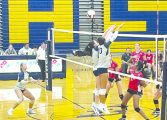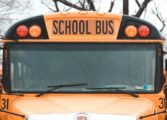Washington pointed out that proviso.
“I just want everyone to be aware of that before voting,” Washington said.
The Board also voted unanimously to adopt a resolution regarding Standards of Learning tests.
In essence, the resolution states that tracking progress should take more information into account than just SOL scores, said superintendent Gena Keller.
“It shouldn’t be the sole indicator of a child’s growth or a teacher’s performance,” Keller said.
Keller said she wanted the community to know that any salary projections made at the budget meeting on Nov. 6 were simply a way to look at the salary structure.
“Anything brought to the table is not a proposal,” Keller said. “It’s another view. Anytime you speak about a person’s salary and benefits it becomes personal – as it should. But we have to start somewhere.”
The Board took the time to recognize teacher veterans and to hear what good things are happening at the high school.
High School Principal James Barlow and his team presented a video made by students entitled “Wake Up. Get Up.”
He said they adopted that attitude after a difficult 2012/2013 school year when they moved into the new school building. Barlow highlighted the newest Career and Technical Education programs: nursing, culinary arts and horticulture.
The staff implemented a new program entitled “No Negative Attitude.” Students showing exceptionally positive attitudes are nominated weekly and one in each grade level is chosen to win a t-shirt and AAA card that gets them into school activities such as football games free.
School Resource Officer Tim Shiflett talked about bullying. He said many don’t realize that girls are more apt to bully and studies show they are more likely to carry out an attack. Shiflett suggested various ways to deal with bullying, from holding parents accountable for their child’s behavior, to problem-solving education for students.
John Herlbert is one of two new counselors at the high school. Herbert is in charge of eighth graders, while Fiona Charles is the new college advisor.
Each eighth grader now creates a career plan sent home to parents during that year and in 10th grade, Herlbert said.
The guidance office plans to develop a master schedule that all students can fill out for themselves, much the way college students do. Students who don’t have access to a computer can use school computers. All students can get help filling out their schedule, Herlbert said.
Changes in math classes, particularly algebra 2 were explained . Teachers met with students having difficulty with the changes and helped them find out and solve problems. That resulted in failing students all bringing up their grades to a C.
Changes in diploma options for special education students are handled now by students getting credit in other ways, including:
• Alternative courses to meet the standard credit requirements;
• Modifications to the requirements for locally awarded verified credits;
• Additional tests approved by the Board of Education for earning verified credits;
• Adjusted cut scores on tests for earning verified credits;
• Allowance of work-based learning experiences through career and technical education (CTE) courses.




